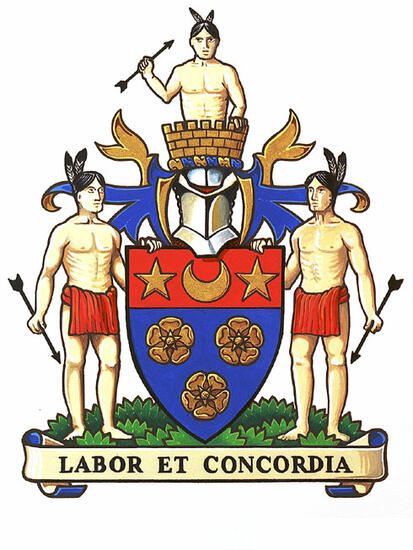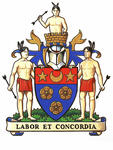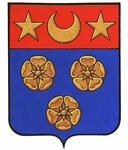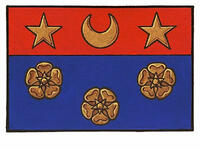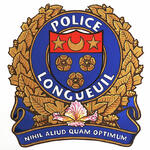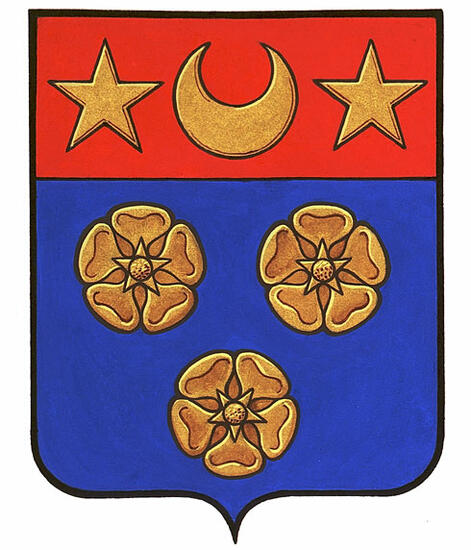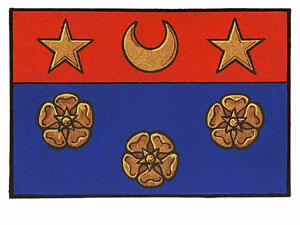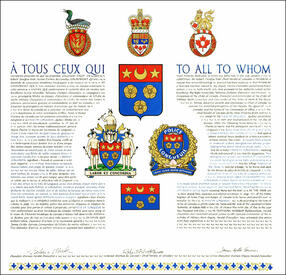The contents of this Register are intended for research purposes only. The heraldic emblems found in the Register may not be reproduced in any form or in any media without the written consent of the Canadian Heraldic Authority and/or the recipient.
Longueuil, Quebec
Grant of Arms, Supporters and Flag, with a Badge to the Service de police de la Ville de Longueuil
May 10, 2004
Vol. IV, p. 372
Arms of the Ville de LongueuilBlazonAzure three roses Or, on a chief Gules a crescent between two mullets Or; SymbolismThe full achievement of arms, with a crest and supporters, are those of Charles Le Moyne (1626-1685), the founder of Longueuil who was ennobled in 1668 and whose son and namesake was created a baron in 1700 by Louis XIV. In 2002, Raymond Grant, a descendant of the Le Moyne family through the female line and Baron of Longueuil, expressed his concurrence with the proposal that the Ville de Longueuil wished to be officially granted the historical arms of Charles Le Moyne. In the depiction of the arms, the three symbols in chief (the crescent and the two stars) are coloured gold (yellow). Since the letters of nobility of 1668 have been lost, the city based its choice on a historical document of the XVIIIth century recording the blazon (written description) of the arms (Paris, B.n.F., Chérin 138, dossier 2844). Other versions of the arms show the three upper symbols as Argent (white). |
CrestBlazonIssuant from a mural crown Or, a demi Indigenous man affronté proper holding in his dexter hand an arrow Sable; SymbolismThe symbolism of this emblem is found in other element(s) of this record. |
MottoBlazonLABOR ET CONCORDIA; SymbolismThe motto meaning "Work and concord", has been used by the Ville de Longueuil for several decades. |
SupportersBlazonTwo Indigenous men proper, each habited of a loincloth Gules, holding an arrow Sable and standing on a grassy mound Vert; SymbolismThe symbolism of this emblem is found in other element(s) of this record. |
Arms of the Ville de LongueuilBlazonAzure three roses Or, on a chief Gules a crescent between two mullets Or; SymbolismThe full achievement of arms, with a crest and supporters, are those of Charles Le Moyne (1626-1685), the founder of Longueuil who was ennobled in 1668 and whose son and namesake was created a baron in 1700 by Louis XIV. In 2002, Raymond Grant, a descendant of the Le Moyne family through the female line and Baron of Longueuil, expressed his concurrence with the proposal that the Ville de Longueuil wished to be officially granted the historical arms of Charles Le Moyne. In the depiction of the arms, the three symbols in chief (the crescent and the two stars) are coloured gold (yellow). Since the letters of nobility of 1668 have been lost, the city based its choice on a historical document of the XVIIIth century recording the blazon (written description) of the arms (Paris, B.n.F., Chérin 138, dossier 2844). Other versions of the arms show the three upper symbols as Argent (white). |
Badge of the Service de police of the Ville de LongueuilBlazonBadge of the Service de police of the Ville de Longueuil: The shield of the Arms of the Ville de Longueuil within an annulus Azure edged Or inscribed POLICE and LONGUEUIL in letters Argent, all within a wreath of maple leaves and birch leaves Or issuant from a blue iris proper, the whole resting on a scroll Azure edged Or and inscribed NIHIL ALIUD QUAM OPTIMUM in letters Argent; SymbolismThe arms of the city in the centre of the badge are surrounded by maple and birch leaves referring to the country and the Province of Quebec. At the base of the badge is a blue iris also representing the province of Quebec. The motto of the Police Department, NIHIL ALIUD QUAM OPTIMUM, means "Nothing but the best". |
Additional InformationCreator(s)Historic arms of Charles Le Moyne of Longueuil and original concept (flag and badge) of the Heralds of the Canadian Heraldic Authority PainterDavid Farrar CalligrapherShirley Mangione Recipient TypeCivil Institution
|

